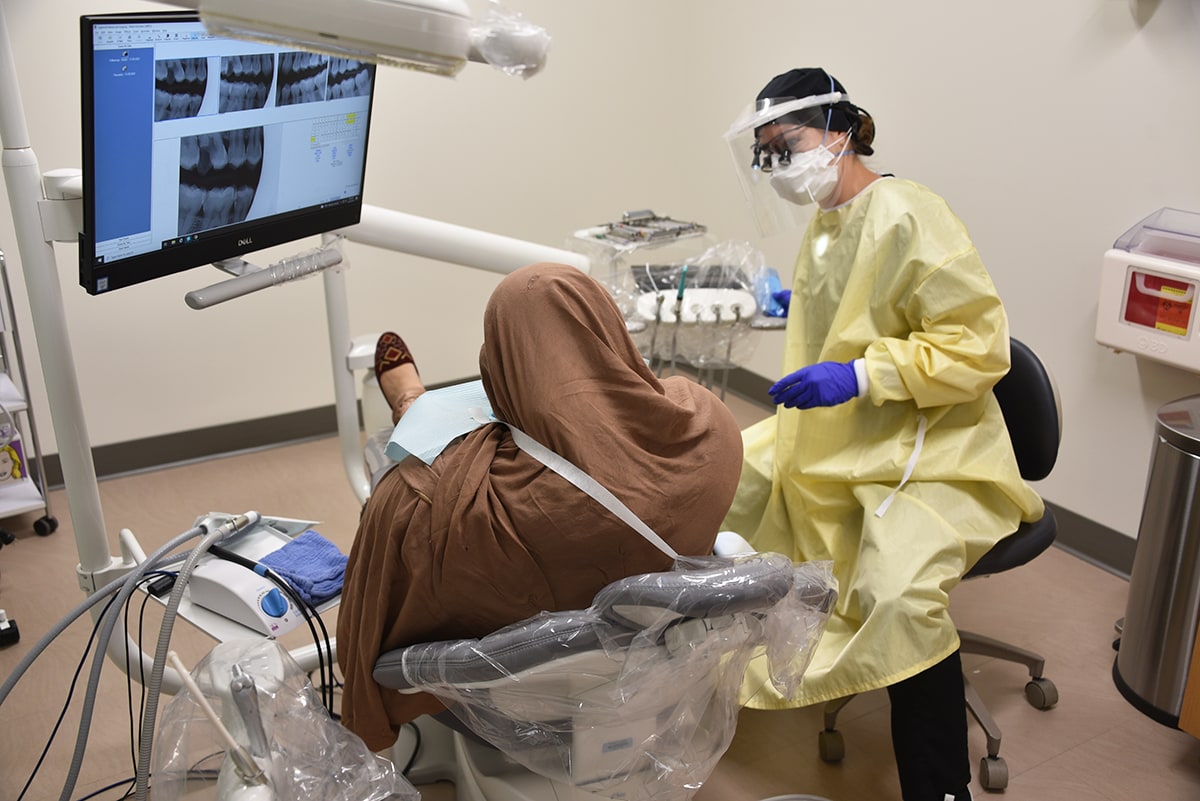View Larger Image

An Afghan refugee woman receives an oral health assessment and dental cleaning at the UAMS Dental Hygiene Clinic.
Image by Ben Boulden
Dental Hygiene Students Treat Afghan Refugee Families
| Since late November, UAMS dental hygiene students have given dozens of Afghan refugees something many of them have never before received – dental care.
At the UAMS Dental Hygiene Clinic in the Freeway Medical Tower, the students first provided teeth cleaning and oral health assessments on Nov. 20 for about 30 Afghan refugees in four families. If needed, they then were referred to the UAMS Delta Dental of Arkansas Foundation Oral Health Clinic for further treatment.
“The majority of them did need referrals and restorative treatment,” said Claire Tucker Ed.D., RDH. “After dental exams, treatment needs were documented on referrals.
Tucker is the chair of the Department of Dental Hygiene in the UAMS College of Health Professions.
“I just wanted to get better and get healthy in here,” Mohammad said through a Pashto-English translator on the phone. “I really didn’t know what to expect, but I’m really pleased with their services.”
Mohammad brought his wife and children to the Dental Hygiene Clinic for treatment.

Students in the UAMS Dental Hygiene program visit with the children of an Afghan refugee family.
Keltie Laseur, a second-year student in the Department of Dental Hygiene, treated Mohammad’s wife and son.
She said the woman was a little apprehensive and was afraid some of her teeth would be extracted. Through the translator, Laseur reassured her that the teeth would only be cleaned.
“I felt like despite the language barrier it was a successful appointment,” Laseur said. “Such a nice, large group of people, it was great to have such a big, positive impact. I like doing this. It is my favorite thing to do, and it gave me more experience working with people who don’t speak my language and working through those obstacles.”
Laseur said she has provided dental care to Spanish- and Urdu-speaking patients before.
Faculty dentists and residents in the Oral Health Clinic set aside a full work day to treat refugees there.
The clinic has cared for 13 Afghan patients, completed 54 fillings and 23 extractions, including a full mouth extraction on a refugee in need of dentures.
Ashley McMillan, DDS, director of UAMS General Practice Residency, said she and the clinic’s other dentists and residents at first were apprehensive about how well translation would work.
However, one Afghan man spoke English fluently and volunteered to translate after his patient visit was over. Phone translation services went smoothly enough that McMillan said “we can schedule them within our normal patient care population” for initial and follow-up visits.
Tucker said plans for treating and assessing the refugees came together very quickly in the fall.
The department held additional clinic sessions in the late fall and early winter, treating a total of about 50 refugees by the end of the outreach effort, she said. The department is covering the cost of the care.
Other than the language barrier on the first day, Tucker said the hygiene clinics went smoothly. The experience in the Oral Health Clinic was similar.
“It bonded our clinic doing a day set aside to care for that population,” McMillan said. “You’re all working toward a common goal, albeit one with linguistic and workflow challenges. You go into it with some trepidation as to the difficulty of the day, but then you conquer it and realize how prepared you were and how smoothly it went, it makes the reward enjoyable.”
While the adults received additional care in the Oral Health Clinic, the Afghan children were seen at Arkansas Children’s.
By working to overcome linguistic and cultural challenges, the standard of care the refugees received was as good as what the Oral Health Clinic provides to English-speaking patients, McMillan said.
Because she leads the General Practice Residency program which trains new dentists and because one of the program’s goals is to find new ways to engage them in community dentistry, caring for the families had an educational benefit as well.
“For us, the experience has been just as rewarding as we would hope it has been for them,” McMillan said.
As for Mohammad, his outlook was hopeful after coming to the United States.
“So far my experience has been good,” he said. “I was removed from Afghanistan because my life was in danger. Here, at least I am safe for now, and then we’ll see what happens.”